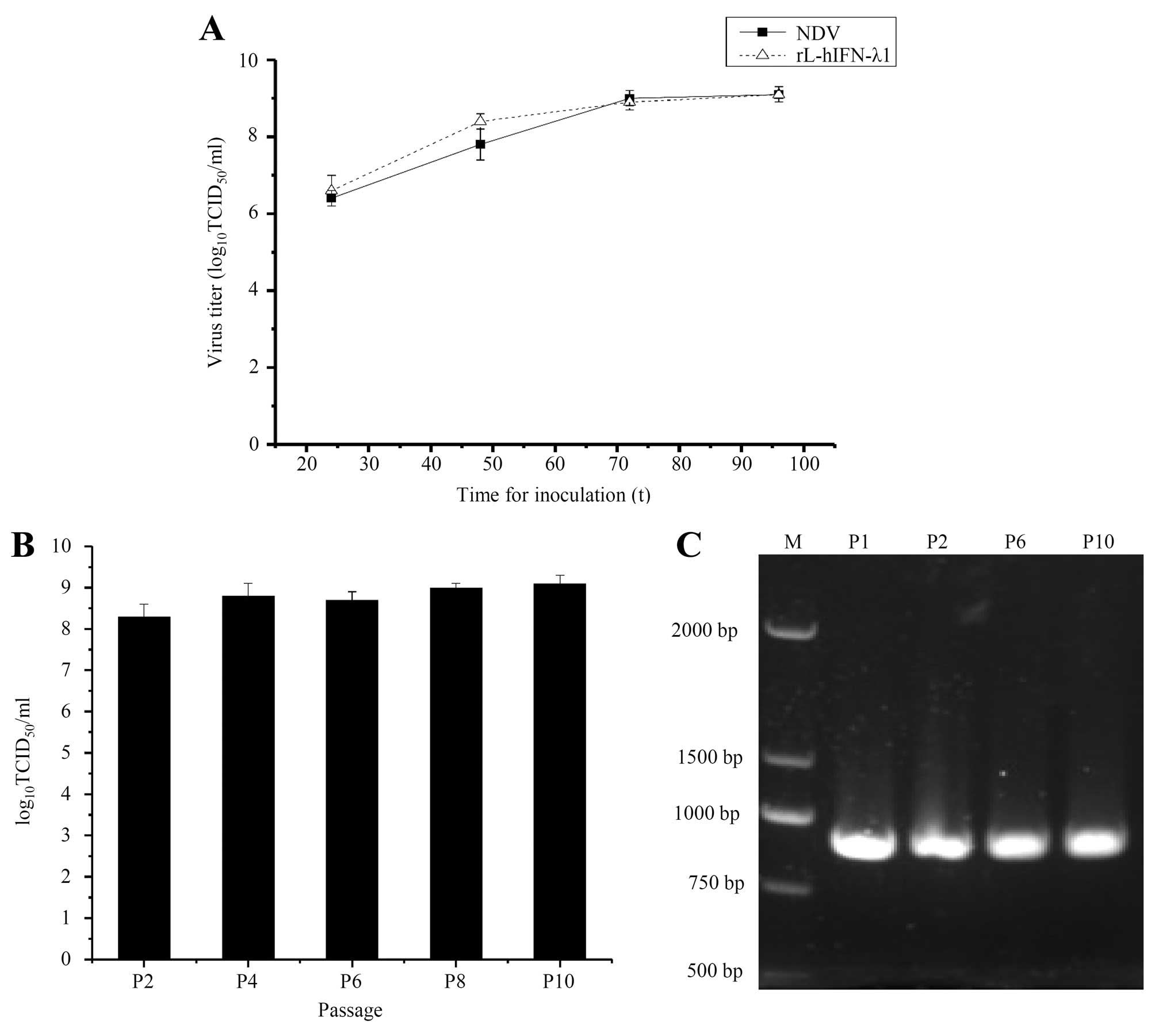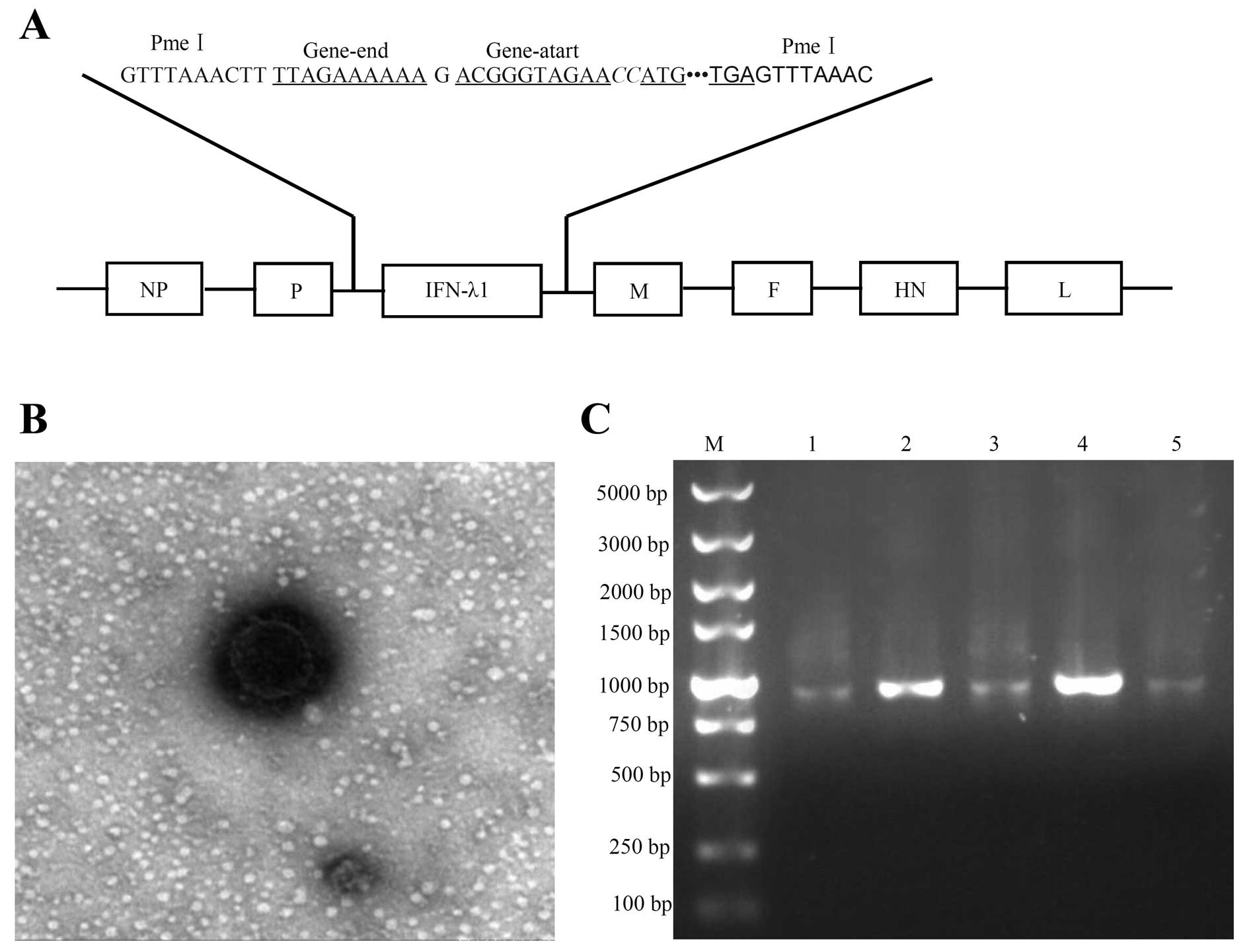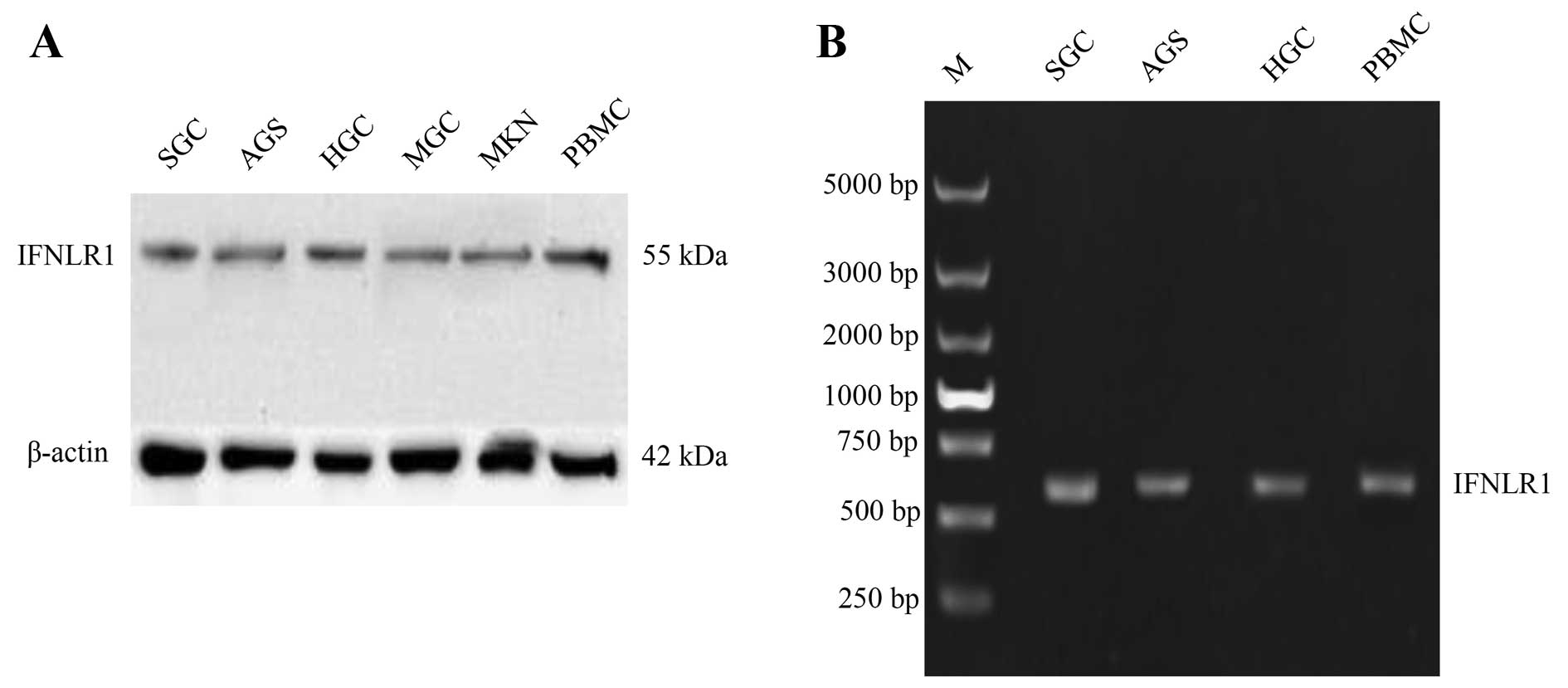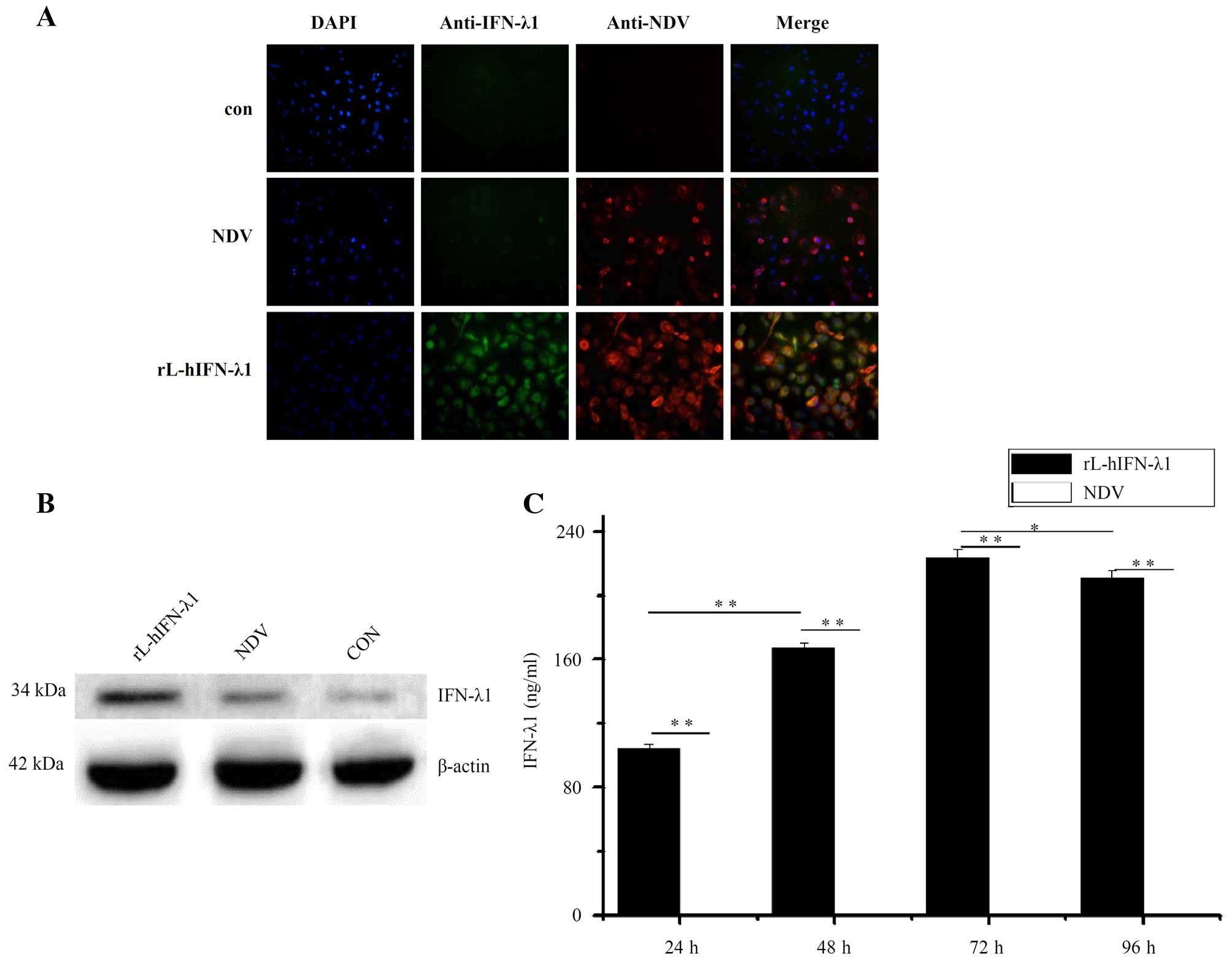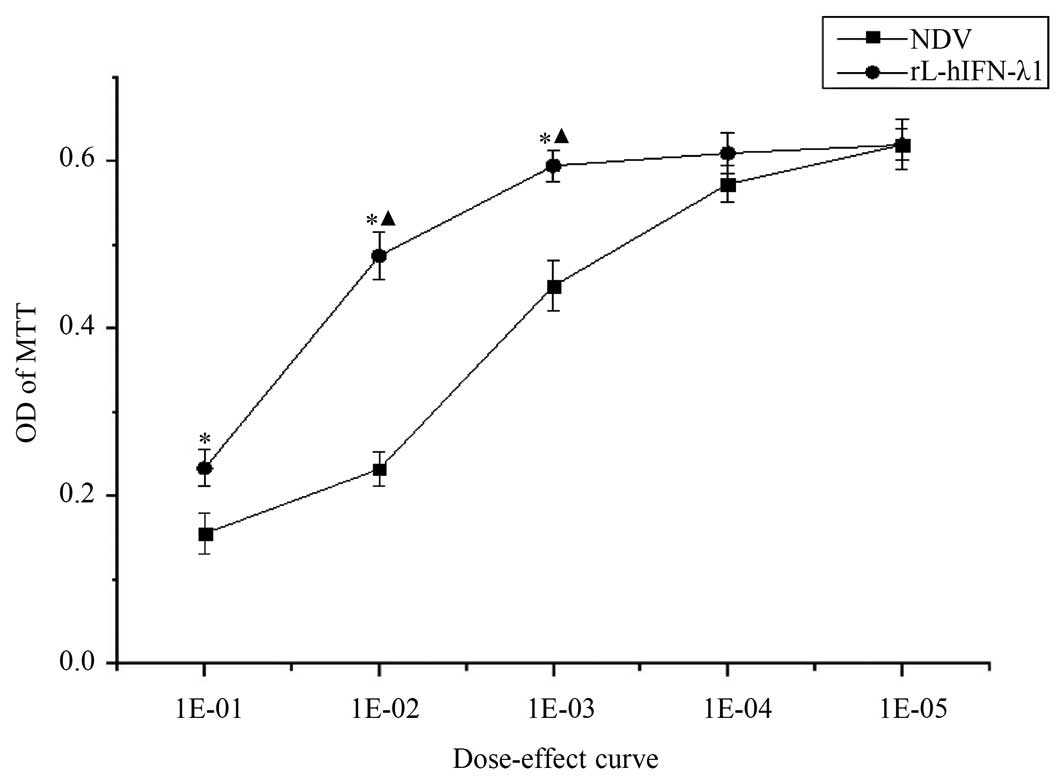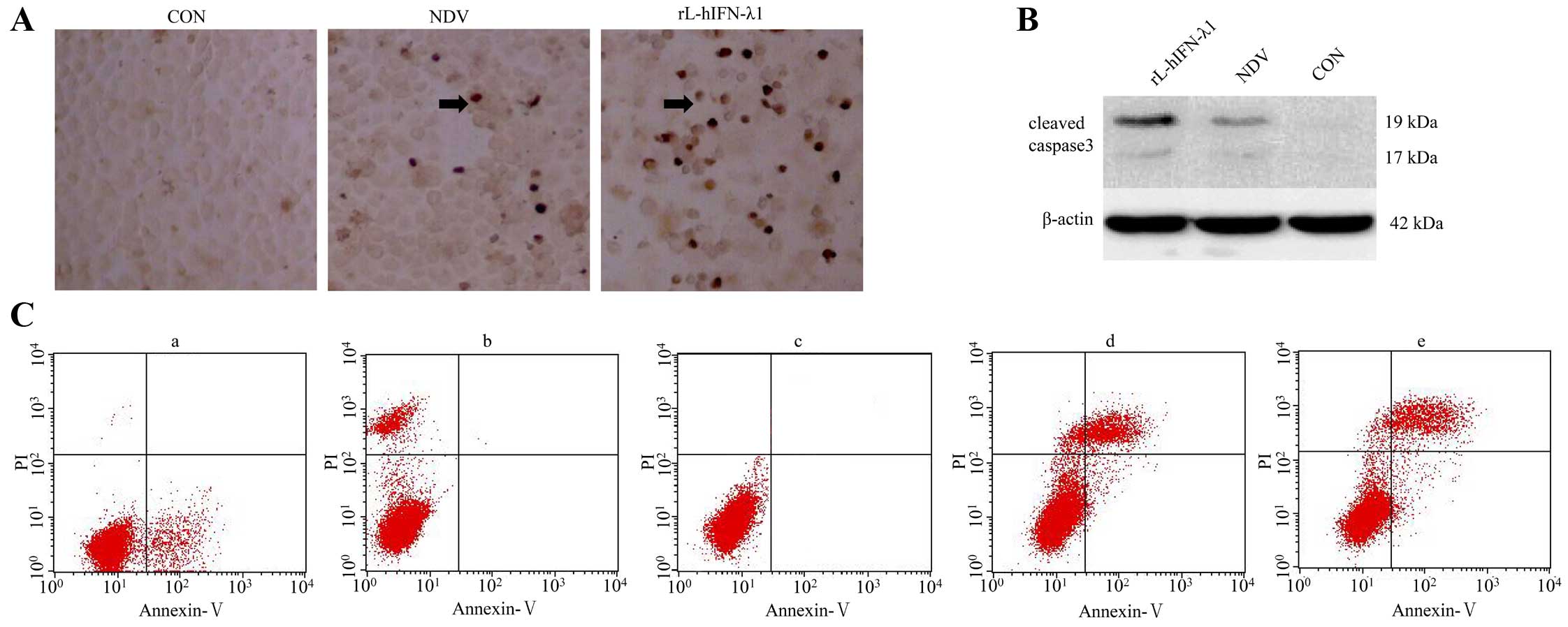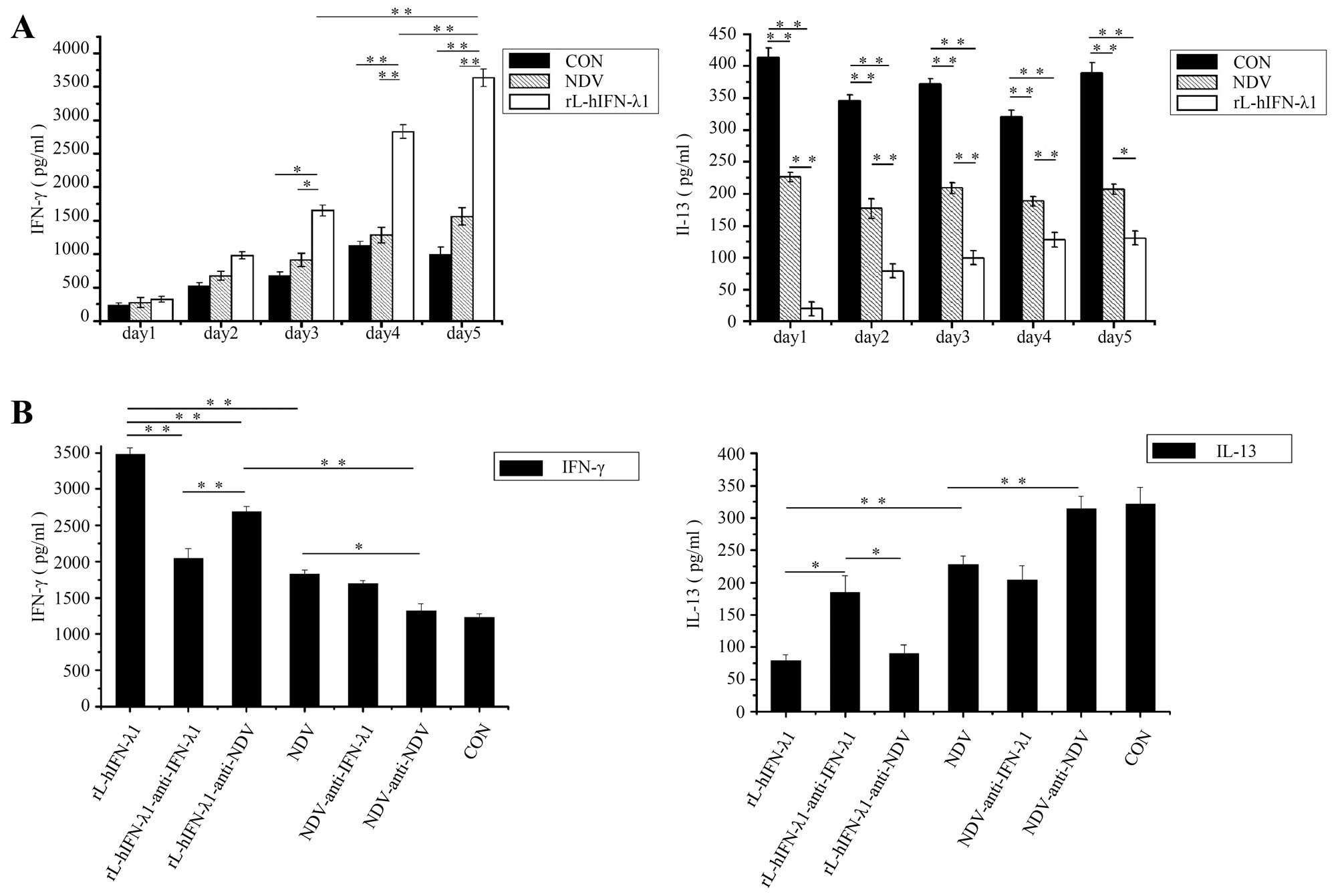|
1
|
Siegel RL, Miller KD and Jemal A: Cancer
statistics, 2015. CA Cancer J Clin. 65:5–29. 2015. View Article : Google Scholar : PubMed/NCBI
|
|
2
|
Khalighinejad N, Hariri H, Behnamfar O,
Yousefi A and Momeni A: Adenoviral gene therapy in gastric cancer:
A review. World J Gastroenterol. 14:180–184. 2008. View Article : Google Scholar : PubMed/NCBI
|
|
3
|
Janke M, Peeters B, de Leeuw O, Moorman R,
Arnold A, Fournier P and Schirrmacher V: Recombinant Newcastle
disease virus (NDV) with inserted gene coding for GM-CSF as a new
vector for cancer immunogene therapy. Gene Ther. 14:1639–1649.
2007. View Article : Google Scholar : PubMed/NCBI
|
|
4
|
Beutner U, Lorenz U, Illert B, Rott L,
Timmermann W, Vollmers HP, Müller-Hermelink HK, Thiede A and
Ulrichs K: Neoadjuvant therapy of gastric cancer with the human
monoclonal IgM antibody SC-1: Impact on the immune system. Oncol
Rep. 19:761–769. 2008.PubMed/NCBI
|
|
5
|
Krishnamurthy S and Samal SK: Nucleotide
sequences of the trailer, nucleocapsid protein gene and intergenic
regions of Newcastle disease virus strain Beaudette C and
completion of the entire genome sequence. J Gen Virol.
79:2419–2424. 1998. View Article : Google Scholar : PubMed/NCBI
|
|
6
|
Bukreyev A and Collins PL: Newcastle
disease virus as a vaccine vector for humans. Curr Opin Mol Ther.
10:46–55. 2008.PubMed/NCBI
|
|
7
|
Bukreyev A, Skiadopoulos MH, Murphy BR and
Collins PL: Nonsegmented negative-strand viruses as vaccine
vectors. J Virol. 80:10293–10306. 2006. View Article : Google Scholar : PubMed/NCBI
|
|
8
|
Ge J, Deng G, Wen Z, Tian G, Wang Y, Shi
J, Wang X, Li Y, Hu S, Jiang Y, et al: Newcastle disease
virus-based live attenuated vaccine completely protects chickens
and mice from lethal challenge of homologous and heterologous H5N1
avian influenza viruses. J Virol. 81:150–158. 2007. View Article : Google Scholar :
|
|
9
|
Ge J, Tian G, Zeng X, Jiang Y, Chen H and
Bua Z: Generation and evaluation of a Newcastle disease virus-based
H9 avian influenza live vaccine. Avian Dis. 54(Suppl 1): 294–296.
2010. View Article : Google Scholar : PubMed/NCBI
|
|
10
|
Elliott S, Egrie J, Browne J, Lorenzini T,
Busse L, Rogers N and Ponting I: Control of rHuEPO biological
activity: The role of carbohydrate. Exp Hematol. 32:1146–1155.
2004. View Article : Google Scholar : PubMed/NCBI
|
|
11
|
Sinclair AM and Elliott S:
Glycoengineering: The effect of glycosylation on the properties of
therapeutic proteins. J Pharm Sci. 94:1626–1635. 2005. View Article : Google Scholar : PubMed/NCBI
|
|
12
|
Sheppard P, Kindsvogel W, Xu W, Henderson
K, Schlutsmeyer S, Whitmore TE, Kuestner R, Garrigues U, Birks C,
Roraback J, et al: IL-28, IL-29 and their class II cytokine
receptor IL-28R. Nat Immunol. 4:63–68. 2003. View Article : Google Scholar
|
|
13
|
Sommereyns C, Paul S, Staeheli P and
Michiels T: IFN-lambda (IFN-lambda) is expressed in a
tissue-dependent fashion and primarily acts on epithelial cells in
vivo. PLoS Pathog. 4:e10000172008. View Article : Google Scholar : PubMed/NCBI
|
|
14
|
Haabeth OA, Lorvik KB, Hammarström C,
Donaldson IM, Haraldsen G, Bogen B and Corthay A: Inflammation
driven by tumour-specific Th1 cells protects against B-cell cancer.
Nat Commun. 2:2402011. View Article : Google Scholar : PubMed/NCBI
|
|
15
|
Mohty AM, Grob JJ, Mohty M, Richard MA,
Olive D and Gaugler B: Induction of IP-10/CXCL10 secretion as an
immunomodulatory effect of low-dose adjuvant interferon-alpha
during treatment of melanoma. Immunobiology. 215:113–123. 2010.
View Article : Google Scholar
|
|
16
|
Pertl U, Luster AD, Varki NM, Homann D,
Gaedicke G, Reisfeld RA and Lode HN: IFN-gamma-inducible protein-10
is essential for the generation of a protective tumor-specific CD8
T cell response induced by single-chain IL-12 gene therapy. J
Immunol. 166:6944–6951. 2001. View Article : Google Scholar : PubMed/NCBI
|
|
17
|
Tominaga M, Iwashita Y, Ohta M, Shibata K,
Ishio T, Ohmori N, Goto T, Sato S and Kitano S: Antitumor effects
of the MIG and IP-10 genes transferred with poly
[D,L-2,4-diaminobutyric acid] on murine neuroblastoma. Cancer Gene
Ther. 14:696–705. 2007. View Article : Google Scholar : PubMed/NCBI
|
|
18
|
Wang P, Yang X, Xu W, Li K, Chu Y and
Xiong S: Integrating individual functional moieties of CXCL10 and
CXCL11 into a novel chimeric chemokine leads to synergistic
antitumor effects: A strategy for chemokine-based
multi-target-directed cancer therapy. Cancer Immunol Immunother.
59:1715–1726. 2010. View Article : Google Scholar : PubMed/NCBI
|
|
19
|
Egeter O, Mocikat R, Ghoreschi K,
Dieckmann A and Röcken M: Eradication of disseminated lymphomas
with CpG-DNA activated T helper type 1 cells from nontransgenic
mice. Cancer Res. 60:1515–1520. 2000.PubMed/NCBI
|
|
20
|
Müller-Hermelink N, Braumüller H, Pichler
B, Wieder T, Mailhammer R, Schaak K, Ghoreschi K, Yazdi A, Haubner
R, Sander CA, et al: TNFR1 signaling and IFN-gamma signaling
determine whether T cells induce tumor dormancy or promote
multistage carcinogenesis. Cancer Cell. 13:507–518. 2008.
View Article : Google Scholar : PubMed/NCBI
|
|
21
|
Shankaran V, Ikeda H, Bruce AT, White JM,
Swanson PE, Old LJ and Schreiber RD: IFNgamma and lymphocytes
prevent primary tumour development and shape tumour immunogenicity.
Nature. 410:1107–1111. 2001. View
Article : Google Scholar : PubMed/NCBI
|
|
22
|
Dai J, Megjugorac NJ, Gallagher GE, Yu RY
and Gallagher G: IFN-lambda1 (IL-29) inhibits GATA3 expression and
suppresses Th2 responses in human naive and memory T cells. Blood.
113:5829–5838. 2009. View Article : Google Scholar : PubMed/NCBI
|
|
23
|
Sargurupremraj M, Pukelsheim K, Hofer T
and Wjst M: Intermediary quantitative traits - an alternative in
the identification of disease genes in asthma? Genes Immun. 15:1–7.
2014. View Article : Google Scholar
|
|
24
|
Stiff A and Carson Iii W: Investigations
of interferon-lambda for the treatment of cancer. J Innate Immun.
7:243–250. 2015. View Article : Google Scholar : PubMed/NCBI
|
|
25
|
Bu X, Wang M, Zhang J, Liu J, Jia L, Liang
B and Yan Y: Recombinant adenovirus expressing hIFN-λ1 inhibits
gastric adenocarcinoma cell line SGC-7901 proliferation. Oncol
Lett. 11:287–292. 2016.PubMed/NCBI
|
|
26
|
Wyatt LS, Moss B and Rozenblatt S:
Replication-deficient vaccinia virus encoding bacteriophage T7 RNA
polymerase for transient gene expression in mammalian cells.
Virology. 210:202–205. 1995. View Article : Google Scholar : PubMed/NCBI
|
|
27
|
Burkart C, Arimoto K, Tang T, Cong X, Xiao
N, Liu YC, Kotenko SV, Ellies LG and Zhang DE: Usp18 deficient
mammary epithelial cells create an antitumour environment driven by
hypersensitivity to IFN-λ and elevated secretion of Cxcl10. EMBO
Mol Med. 5:967–982. 2013. View Article : Google Scholar : PubMed/NCBI
|
|
28
|
Reichard KW, Lorence RM, Cascino CJ,
Peeples ME, Walter RJ, Fernando MB, Reyes HM and Greager JA:
Newcastle disease virus selectively kills human tumor cells. J Surg
Res. 52:448–453. 1992. View Article : Google Scholar : PubMed/NCBI
|
|
29
|
Foucault C, Mordant P, Grand B, Achour K,
Arame A, Dujon A, Le Pimpec Barthes F and Riquet M: Unexpected
extensions of non-small-cell lung cancer diagnosed during surgery:
Revisiting exploratory thoracotomies and incomplete resections.
Interact Cardiovasc Thorac Surg. 16:667–672. 2013. View Article : Google Scholar : PubMed/NCBI
|
|
30
|
Vähä-Koskela MJ, Heikkilä JE and Hinkkanen
AE: Oncolytic viruses in cancer therapy. Cancer Lett. 254:178–216.
2007. View Article : Google Scholar : PubMed/NCBI
|
|
31
|
Hossain A, Radwan FF, Doonan BP, God JM,
Zhang L, Bell PD and Haque A: A possible cross-talk between
autophagy and apoptosis in generating an immune response in
melanoma. Apoptosis. 17:1066–1078. 2012. View Article : Google Scholar : PubMed/NCBI
|
|
32
|
Lam HY, Yeap SK, Rasoli M, Omar AR, Yusoff
K, Suraini AA and Alitheen NB: Safety and clinical usage of
Newcastle disease virus in cancer therapy. J Biomed Biotechnol.
2011:7187102011. View Article : Google Scholar : PubMed/NCBI
|
|
33
|
Nakaya T, Cros J, Park MS, Nakaya Y, Zheng
H, Sagrera A, Villar E, García-Sastre A and Palese P: Recombinant
Newcastle disease virus as a vaccine vector. J Virol.
75:11868–11873. 2001. View Article : Google Scholar : PubMed/NCBI
|
|
34
|
Lasfar A, Abushahba W, Balan M and
Cohen-Solal KA: Interferon lambda: A new sword in cancer
immunotherapy. Clin Dev Immunol. 2011:3495752011. View Article : Google Scholar : PubMed/NCBI
|
|
35
|
Steen HC and Gamero AM: Interferon-lambda
as a potential therapeutic agent in cancer treatment. J Interferon
Cytokine Res. 30:597–602. 2010. View Article : Google Scholar : PubMed/NCBI
|
|
36
|
Jordan WJ, Eskdale J, Srinivas S, Pekarek
V, Kelner D, Rodia M and Gallagher G: Human interferon lambda-1
(IFN-lambda1/IL-29) modulates the Th1/Th2 response. Genes Immun.
8:254–261. 2007. View Article : Google Scholar : PubMed/NCBI
|
|
37
|
Ding S, Khoury-Hanold W, Iwasaki A and
Robek MD: Epigenetic reprogramming of the type III interferon
response potentiates antiviral activity and suppresses tumor
growth. PLoS Biol. 12:e10017582014. View Article : Google Scholar : PubMed/NCBI
|
|
38
|
Elankumaran S, Rockemann D and Samal SK:
Newcastle disease virus exerts oncolysis by both intrinsic and
extrinsic caspase-dependent pathways of cell death. J Virol.
80:7522–7534. 2006. View Article : Google Scholar : PubMed/NCBI
|
|
39
|
Hrabák A, Csuka I, Bajor T and Csatáry LK:
The cytotoxic antitumor effect of MTH-68/H, a live attenuated
Newcastle disease virus is mediated by the induction of nitric
oxide synthesis in rat peritoneal macrophages in vitro. Cancer
Lett. 231:279–289. 2006. View Article : Google Scholar
|
|
40
|
Bian H, Fournier P, Peeters B and
Schirrmacher V: Tumor-targeted gene transfer in vivo via
recombinant Newcastle disease virus modified by a bispecific fusion
protein. Int J Oncol. 27:377–384. 2005.PubMed/NCBI
|
|
41
|
Lorence RM, Rood PA and Kelley KW:
Newcastle disease virus as an antineoplastic agent: Induction of
tumor necrosis factor-alpha and augmentation of its cytotoxicity. J
Natl Cancer Inst. 80:1305–1312. 1988. View Article : Google Scholar : PubMed/NCBI
|
|
42
|
Bu XF, Wang MB, Zhang ZJ, Zhao YH, Li M
and Yan YL: Autophagy is involved in recombinant Newcastle disease
virus (rL-RVG)-induced cell death of stomach adenocarcinoma cells
in vitro. Int J Oncol. 47:679–689. 2015.PubMed/NCBI
|
|
43
|
Fábián Z, Töröcsik B, Kiss K, Csatary LK,
Bodey B, Tigyi J, Csatary C and Szeberényi J: Induction of
apoptosis by a Newcastle disease virus vaccine (MTH-68/H) in PC12
rat phaeochromo-cytoma cells. Anticancer Res. 21(1A): 125–135.
2001.PubMed/NCBI
|
|
44
|
Fábián Z, Csatary CM, Szeberényi J and
Csatary LK: p53-independent endoplasmic reticulum stress-mediated
cytotoxicity of a Newcastle disease virus strain in tumor cell
lines. J Virol. 81:2817–2830. 2007. View Article : Google Scholar : PubMed/NCBI
|
|
45
|
Fábián Z, Vecsernyés M, Pap M and
Szeberényi J: The effects of a mutant p53 protein on the
proliferation and differentiation of PC12 rat phaeochromocytoma
cells. J Cell Biochem. 99:1431–1441. 2006. View Article : Google Scholar : PubMed/NCBI
|















